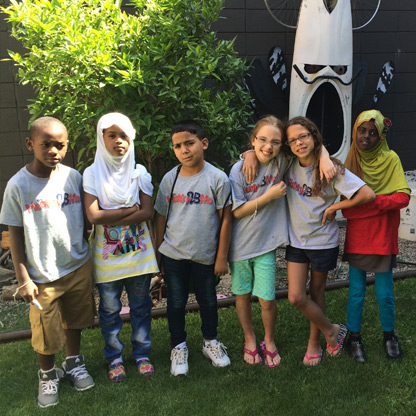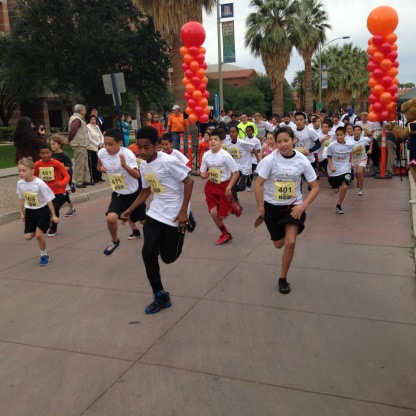 Healthy 2B Me Camp
Healthy 2B Me Camp Tucson Marathon Family Fitness Fest
Tucson Marathon Family Fitness FestThe Mel and Enid Zuckerman College of Public Health is home to several research-funded and interprofessional centers, whose members engage in public health research, service and teaching.
- Arizona Prevention Research Center (AzPRC)
-
The mission of the Arizona Prevention Research Center (AzPRC) is to partner with communities to improve the health and well-being of people living in the U.S.-Mexico Border states through research, training, advocacy and policy change. The AzPRC houses diverse programs and activities that use community-based participatory action research to focus on the prevention of chronic disease in the border region. The philosophy of the AzPRC is that improving health outcomes requires a collaborative partnership between universities and communities. Visit the website: azprc.arizona.edu
- Western Regional Public Health Training Center (WRPHTC)
-
The Western Region Public Health Training Center provides free training and continuing education for the public health workforce in Region 9 of the Health Resources and Services Administration (HRSA), an agency of the U.S. Department of Health and Human Services, which covers Arizona, California, Nevada, Hawaii and the U.S. Affiliated Pacific Islands.
We are a consortium of public health professionals that have a mission to develop, provide and monitor need-based trainings for current and future community health workers to strengthen their public health competencies. We also provide additional expertise in the areas of nutrition, physical activity and obesity to the national network of Public Health Training Centers.
The consortium consists of a local performance site at the University of Arizona Mel and Enid Zuckerman College of Public Health; University of Nevada, Reno, School of Community Health Sciences; University of Hawai’i, Manoa, Department of Public Health Sciences; Pacific Island Health Officers Association; and University of California, San Francisco, ant the California Area Health Education Center Program.
Our vision is to have a strong collaborative public health network and public health workforce that collectively works towards the development of healthy communities in HRSA Region 9 and the Nation. Visit the website: wrphtc.arizona.edu
- Arizona Smokers' Helpline (ASHLine)
-
The Arizona Smokers' Helpline (ASHLine) has provided telephone tobacco cessation services to all tobacco users who wish to quit tobacco in the State of Arizona since 1997. The ASHLine is a comprehensive quitline providing callers with information, counseling and medications in their efforts to quit tobacco. The ASHLine is uniquely partnered with the Arizona Department of Health Services Bureau of Tobacco and Chronic Disease to reach communities and increase the use of the quitline. ASHLine has a highly trained group of health educators that work directly with health care systems to incorporate tobacco assessment and referral into the daily operations of providers. ASHLine has a robust referral program partnering with thousands of health professionals and hundreds of health networks statewide. The focus of these partnerships is 'health systems change' as laid out in the 'US PHS Clinical Practice Guideline: Treating Tobacco Use and Dependence, 2008 Update.' Through these partnerships ASHLine receives almost 15,000 proactive client referrals annually, in which health professionals fax or electronically submit client consent for contact to ASHLine and our staff reach out via phone to offer quit tobacco services Visit the website: ashline.org
- Asthma & Airway Disease Research Center
-
The Asthma & Airway Disease Research Center is an interdisciplinary Center of Excellence at the University of Arizona dedicated to research, clinical care, medical education, and community service in the areas of adult and pediatric pulmonary medicine. Lynn Gerald, PhD, MSPH, professor of health promotion sciences at the Mel and Enid Zuckerman College of Public Health, is associate director for clinical research at the Asthma & Airway Disease Research Center.
- Zuckerman Family Center for Prevention and Health Promotion (ZFCPHP)
-
The Zuckerman Family Center for Prevention and Health Promotion (ZFCPHP) is dedicated to helping people achieve and maintain healthy lives by providing a variety of opportunities that facilitate and support growth toward health and well-being. The ZFCPHP fosters the collaboration of academic, community and public health stakeholders by using research, education, advocacy, awareness, and service delivery to improve the health and well-being of the Tucson community. The ZFCPHP supports practical application of strategies that can assist individuals and communities in adopting and maintaining healthy lifestyles. The center has partnered with local health service providers, other colleges within the university, and faith-based organizations to deliver quality health education in the area of diet, physical activity and obesity prevention. The goal of the ZFCPHP is to promote health and wellness in the greater Tucson area, thus establishing Tucson as the center of wellness for the U.S. Visit the website: zfcphp.arizona.edu
- Center for Rural Health (CRH)
-
The mission of the Arizona Center for Rural Health (AzCRH) is to improve the health and wellness of Arizona’s rural and vulnerable populations. Established in 1982 as the Rural Health Office, it was renamed the Arizona Center for Rural Health in 2011 and moved to it's new home within the Mel and Enid Zuckerman College of Public Health. The Center is a hub for collaboration with rural and underserved communities in Arizona, the southwest, and the border. In 1990, congressional legislation authorized establishing the Arizona State Office of Rural Health (AzSORH) with federal funding matching 1:3 ongoing state appropriations. AzSORH is a core Center program providing technical assistance, disseminating information, and coordinating rural health partnerships and activities, in conjunction with other programs and activities to positively impact rural and border health outcomes. The AzCRH houses five state and federally funded programs: The Arizona Rural Hospital Flexibility Program (Health Resources and Services Administration-HRSA), the Small Rural Hospital Improvement Program (HRSA), the AzCRH Navigator Consortium (CMS/CCIIO), the Arizona Prescription Drug Misuse and Abuse Initiative (CDC-Arizona Department of Health Services Interagency Services Agreement (ISA), and the First Responders Opioid Training Initiative (SAMHSA-ADHS-ISA). The AzCRH faculty and staff provide data, synthesis, analysis, reports, and education to inform state, federal, and border legislative, regulatory, and program evaluation processes. Visit the website: crh.arizona.edu
- Global Health Institute
-
The Global Health Institute's goal is to provide a comprehensive and integrated focal point for innovative public health education, scholarship, research, advocacy, and leadership training for the UA Zuckerman College of Public Health, UA and GHI' s partners. The GHI is dedicated to finding evidence-based solutions to global health problems through the education and training of tomorrow's global health leaders. The overall mission of GHI is to promote the health of individuals and communities in Arizona, the Southwest and globally through excellence in education, research & service. Visit the website:ghi.arizona.edu.
- Center for American Indian Resilience (CAIR)
-
The Center for American Indian Resilience (CAIR), an Exploratory Center for Excellence supported by the National Institute of Health's National Institute of Minority Health and Health Disparities. Northern Arizona University (NAU), University of Arizona (UA) and Diné College together with community partners collaborate to understand, teach, and share stories of resilience in American Indian communities. Their mission is to partner with American Indian communities to promote health and resilience. Read more...








